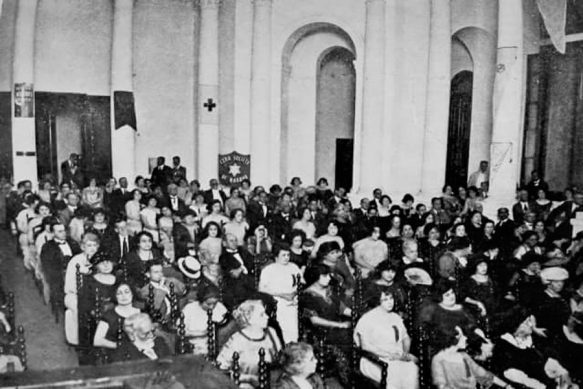
A groundbreaking lecture by historian Raquel Vinat de la Mata on the women’s movement leading to the First National Congress of Cuban Women, held at Havana’s Teatro Nacional from April 1 to 7, 1923, the first of its kind in Latin America. Its celebration was preceded by the founding in 1918 of the Club Femenino de Cuba, spearheaded by several suffragist associations. Ideologically pluralistic, the 1923 conference was comprised by 31 organizations, and its delegates included adherents to Catholicism, Protestantism, Judaism and Theosophy.
In its closing resolutions, they demanded the implementation of women’s suffrage; equality of rights and responsibilities with men; combatting drug use and prostitution; and, among other things, the transformation of the educational system and the protection of children.
The lecture will be followed by a Q&A session via Zoom with Prof. Vinat, moderated by Iraida Iturralde, of our History Program.
This event is part of our CreateNYC Language Access Series on Cuban History, Art, and Literature. It will be held in Spanish and will be streamed through our YouTube channel.
TO ATTEND, CLICK HERE ON THE SCHEDULED DATE AND TIME:
https://youtu.be/rK4INbPINtw
To participate in the Q&A via Zoom, click here:
https://us06web.zoom.us/j/89526024766
[Photo above: First National Women’s Congress, Auditorium of the Academy of Sciences, Havana, 1923]
 Las cubanas en la posguerra; and Después de la guerra: ¿la paz? In 1983 she co-founded the Chair for Gender Studies at the University of Havana. Her all-encompassing doctoral thesis on the emergence and trajectory of the Cuban feminist movement in the 19th century remains unpublished, as well as four other books on key aspects of women’s role in Cuban society: Sociabilidad femenina cubana: asociacionismo y liderazgo en el siglo XIX; La mujer normada: redes de opresión y alternativas de resistencia; Presencia femenina en las publicaciones cubanas del siglo XIX; and Vida y acción de las cubanas durante la Reconcentración. During her tenure at the Instituto de Historia, and presently as an independent researcher, she has uncovered invaluable documentation that sheds new light on the social and political consciousness of women in 19th century Cuba. These not only include first-hand testimonials by white women, but also by slave and free black women. Prof. Vinat’s articles on related topics, including dance and gender, the female musical discourse, religion, woman and the family, cultural identity, and racism have appeared in scholarly journals in Cuba, Mexico, Venezuela, the Dominican Republic, and Spain.
Las cubanas en la posguerra; and Después de la guerra: ¿la paz? In 1983 she co-founded the Chair for Gender Studies at the University of Havana. Her all-encompassing doctoral thesis on the emergence and trajectory of the Cuban feminist movement in the 19th century remains unpublished, as well as four other books on key aspects of women’s role in Cuban society: Sociabilidad femenina cubana: asociacionismo y liderazgo en el siglo XIX; La mujer normada: redes de opresión y alternativas de resistencia; Presencia femenina en las publicaciones cubanas del siglo XIX; and Vida y acción de las cubanas durante la Reconcentración. During her tenure at the Instituto de Historia, and presently as an independent researcher, she has uncovered invaluable documentation that sheds new light on the social and political consciousness of women in 19th century Cuba. These not only include first-hand testimonials by white women, but also by slave and free black women. Prof. Vinat’s articles on related topics, including dance and gender, the female musical discourse, religion, woman and the family, cultural identity, and racism have appeared in scholarly journals in Cuba, Mexico, Venezuela, the Dominican Republic, and Spain.This event is supported, in part, by public funds from the New York City Department of Cultural Affairs in partnership with the City Council, and made possible by the New York State Council on the Arts with the support of the Office of the Governor and the New York State Legislature.
![]()
![]()
With the promotional collaboration of
 and
and
![]()